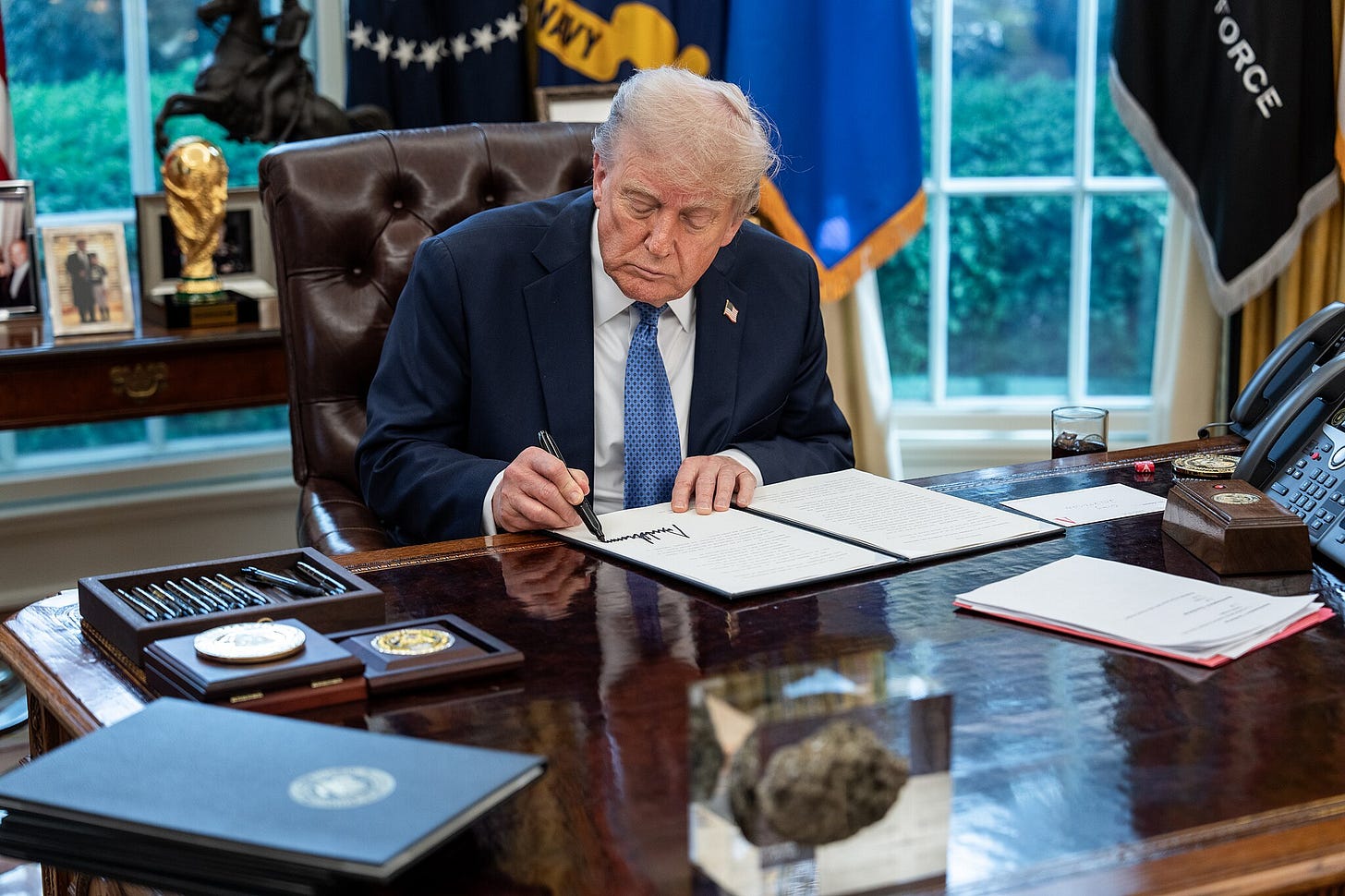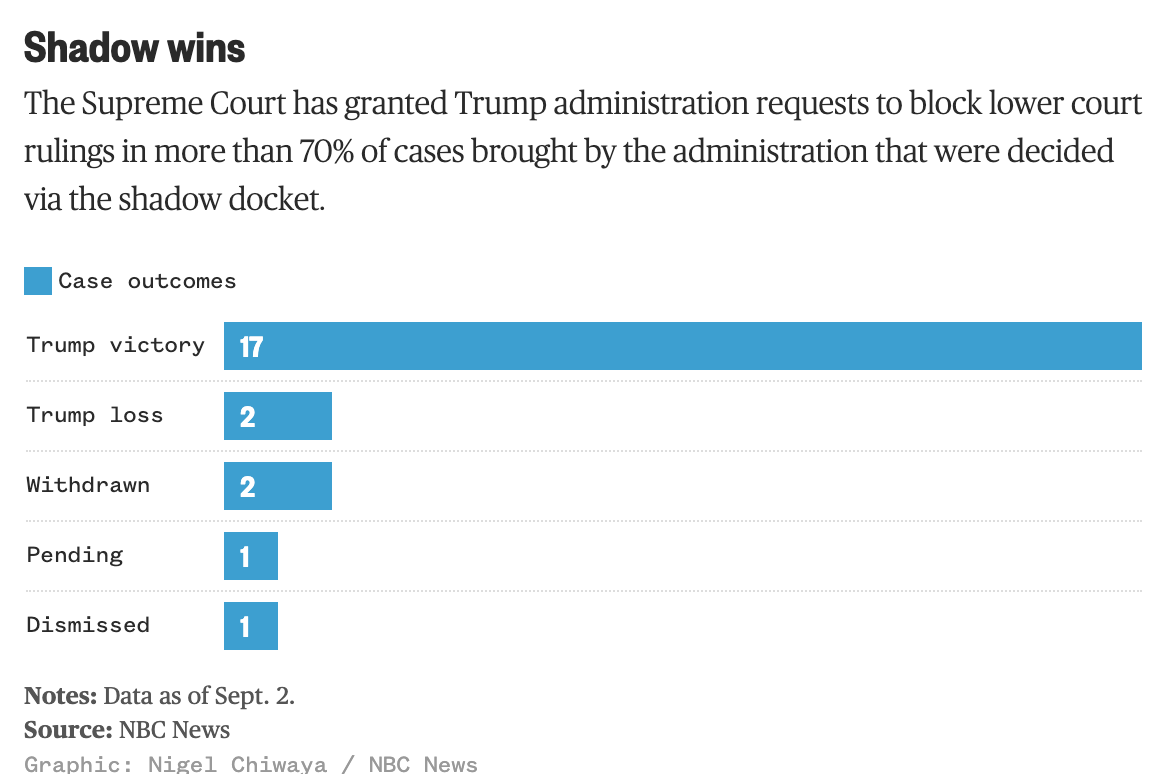Judges Rebuke Trump’s Fake Emergencies, Dealing A Series Of Blows To His Authoritarian Power Grabs
From tariffs to troop deployments to deportations, multiple federal judges found Trump’s reliance on fake emergencies illegal and warned of the "ongoing risk" of unlawful overreach.

Thank you for reading! In the face of unrelenting disinformation and authoritarian actions, clear truth-telling and independent media are a necessity. If you value pro-democracy journalism, consider becoming a free or paid subscriber to my newsletter. Paid subscribers empower this work and gain access to exclusive benefits. Your support makes a difference.
In an effort to grab authoritarian power he does not have, President Trump governs by emergency, not by popular mandate - a point I emphasized in my recent appearances on MSNBC’s The 11th Hour and The Weekend.
In a string of major legal losses, Trump’s unlawful use of emergency declarations faced unmistakable rebukes by federal judges.
As I wrote in my article on Trump’s D.C. crackdown, Trump’s second term has been defined by his exploitation of unlawful emergency declarations seeking false justifications for expanding his power. Trump leaned on fabricated emergencies to provide a rationale for his deployment of troops to LA, his effort to deport immigrants under the Alien Enemies Act, and his tariffs that have disrupted the global economy - to name a few.
Each of those endeavors was just deemed illegal in federal court.
Last Friday, the U.S. Court of Appeals for the Federal Circuit ruled that President Trump unlawfully asserted emergency powers when implementing tariffs, reaffirming a lower court’s decision that The International Emergency Economic Powers Act does not authorize Trump’s tariff executive orders. While deeming them illegal, the court still left the tariffs in place, giving the Trump Administration time to appeal.
“Tariffs are a tax, and the Framers of the Constitution expressly contemplated the exclusive grant of taxing power to the legislative branch… Setting tariff policy was thus considered a core Congressional function,” the court outlined.
Trump has appealed this ruling to the Supreme Court, in hopes that the 6-3 right-wing majority will grant him the power he yearns for.
That tariff ruling was only the beginning.
On Monday, Judge Charles R. Breyer of the Federal District Court in San Francisco ruled that President Trump and Secretary of Defense Pete Hegseth’s deployment of National Guard troops to LA was illegal.
The ruling declared that the Trump Administration “systematically used armed soldiers (whose identity was often obscured by protective armor) and military vehicles to set up protective perimeters and traffic blockades, engage in crowd control, and otherwise demonstrate a military presence in and around Los Angeles. In short, Defendants violated the Posse Comitatus Act.”
Under the Posse Comitatus Act of 1878, the military is barred from engaging in civilian law enforcement.
Judge Breyer went further, detailing how the Trump Administration claimed they were quelling a “rebellion” that didn’t exist. The Trump Administration “deployed the National Guard and Marines to Los Angeles, ostensibly to quell a rebellion and ensure that federal immigration law was enforced,” Judge Breyer wrote. “There were indeed protests in Los Angeles, and some individuals engaged in violence. Yet there was no rebellion, nor was civilian law enforcement unable to respond to the protests and enforce the law.”
Judge Breyer warned that the Trump Administration has threatened to deploy troops to other cities, “thus creating a national police force with the President as its chief.” Judge Breyer noted the “ongoing risk” that the Trump Administration will “act unlawfully” required this ruling.
There you have it, in black and white, yet another federal court striking down Trump’s attempt to manufacture an emergency in a bid to grab power, while also warning of future unlawful efforts.
The next day, President Trump was dealt another loss.
On Tuesday, the U.S. Court of Appeals for the 5th Circuit ruled that President Trump unlawfully invoked The Alien Enemies Act of 1798 to deport Venezuelan migrants without due process. Trump sought to claim there is a fake immigration emergency in the form of an “invasion,” which is the circumstance required to invoke the 18th-century law. In a 2-1 decision, the court found “no invasion” to justify its invocation and blocked further deportations seeking to do so.
From the ruling court doc:
“Our analysis leads us to GRANT a preliminary injunction to prevent removal because we find no invasion or predatory incursion… A country’s encouraging its residents and citizens to enter this country illegally is not the modern-day equivalent of sending an armed, organized force to occupy, to disrupt, or to otherwise harm the United States. There is no finding that this mass immigration was an armed, organized force or forces.”
In those three rulings, you can clearly see the pattern - Courts essentially saying that the Trump Administration is fabricating emergencies in order to pursue policy goals that are not within the president’s power.
Even outside of emergency powers, Trump has used false pretenses to target institutions like universities, and judges are calling him out. On Wednesday, a federal judge struck down President Trump’s effort to freeze $2.6 billion in research funds allocated to Harvard University.
“A review of the administrative record makes it difficult to conclude anything other than that (the government) used antisemitism as a smokescreen for a targeted, ideologically-motivated assault on this country’s premier universities,” wrote U.S. District Judge Allison Burroughs in her decision. That’s a remarkable statement from a federal judge.
All of these rulings effectively accuse the Trump Administration of lying to create false justifications for authoritarian overreach.
The Supreme Court will ultimately have the final say in these matters, with the tariff decision likely to be first.
The law in these cases appears to be straightforward, but given the conduct of the right-wing majority of the Supreme Court under Chief Justice Roberts, it’s understandable to be pessimistic about the potential outcome of these rulings.
In interviews with NBC News, 10 federal judges raised concerns about a disturbing pattern they’ve noticed with the conservative majority Supreme Court’s use of the “Shadow Docket”:
“Lower court judges are handed contentious cases involving the Trump administration. They painstakingly research the law to reach their rulings. When they go against Trump, administration officials and allies criticize the judges in harsh terms. The government appeals to the Supreme Court, with its 6-3 conservative majority.
And then the Supreme Court, in emergency rulings, swiftly rejects the judges’ decisions with little to no explanation.”
The Roberts court has been greenlighting different components of the unitary executive theory for years, most notably in their 2024 immunity ruling.
But some of these power grabs are so blatant, they might go too far for SCOTUS. We’ll see. Hopefully, cooler heads prevail, and the Supreme Court doesn’t empower the president with the ability to declare fake emergencies to justify unilateral abuses of power whenever they choose.
That would be a step towards outright authoritarianism. For now, I glean a glimmer of hope from the rulings over the past week, and I give major props to the federal judges who are saying the truth in no uncertain terms: President Trump is lying and illegally seeking to grab power that he does not yet have.
I hope SCOTUS keeps it that way.





Excellent as always, Ahmed. The lower courts seem to be trying to save democracy, but the Supremes are shadowy, eh?
Some lower court Judges are voicing concerns about the Supreme Court. Very unusual for Judges to speak to the press. https://www.nbcnews.com/politics/supreme-court/supreme-court-trump-cases-federal-judges-criticize-rcna221775